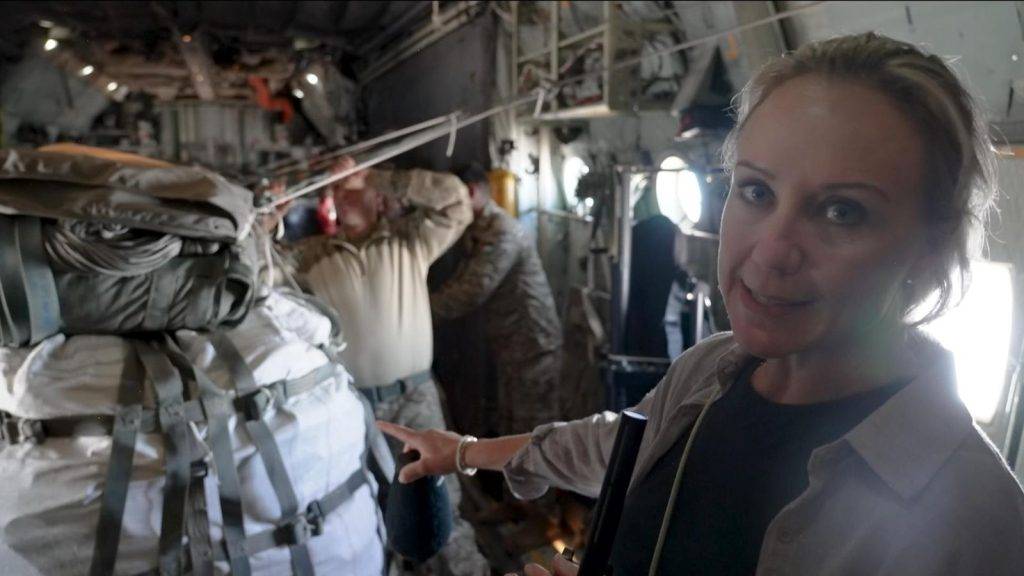Cliff Notes
- The Royal Jordanian Air Force conducted one of the first aid drop flights into Gaza, delivering eight tonnes of food and baby formula as the region faces a severe humanitarian crisis.
- Airdrop methods are deemed flawed; chaotic scenes on the ground saw individuals fighting for limited aid, raising concerns that it fails to reach those most in need.
- Despite calls for increased road aid distribution during temporary humanitarian pauses in fighting, the situation remains critical, with hospitals reporting starvation-related deaths amid continuous airstrikes.
Mile after mile of grey rubble – the view from a plane dropping aid to Gaza
We are on our way to Gaza with the Jordanian military who are coordinating a food drop, and the first thing you notice is, mile after mile of grey rubble. A civilisation has been demolished, a people have been ethnically cleansed and now they move on to a concentration camp in Rafah.
First hand witness to the genocide
The aircraft is hot and noisy and as we get closer, the atmosphere gets more tense. Aircrew gesture with their hands to tell us how many minutes there are to go. Fifteen. Six. One.
The Jordanian military C-130 flies out over the sea before banking and heading inland for Gaza. The parachutes, attached to the top of each of the eight pallets, are prepared for the drop.
As land approaches, I look down. The ground is modern and built up – we’re still over southern Israel.
Then a few short minutes later, it’s clear we’ve crossed Gaza’s border.
The ground turns grey, the shapes of buildings disappear, there are no cars, no people.
You can see the outline of communities and villages that are now flattened. Mile after mile of grey rubble.
This mission by the Royal Jordanian Air Force is one of the first aid drop flights since Israel announced they could resume. It is carrying eight tonnes of food and baby formula.
Foreign nations know this is a deeply flawed way of delivering aid – road convoys are far more effective and can carry far more – but the Jordanian flight crew say the need in Gaza is so urgent, it’s simply an attempt to do something.
When the aircraft ramp opens, the aid is pushed out and it’s gone in seconds.
The parachutes seem peaceful as they open and their fall slows. But dropping food from the sky is a dangerous and undignified way to feed people.
On the ground it’s chaos.
Our colleagues in Gaza say the fighting for food has become lethal – gangs are now punching and stabbing people to reach it first. Most critically, it’s not getting to the weakest. To those who really need it.
One man becomes emotional as he describes racing to find food and leaving with nothing.
“I came only for my son,” he says. “I wouldn’t come here if it was just for me. When you have a child, they need bread.”
He’s an engineer in normal times and seems in disbelief that his life has come to this. “The aid comes from the sky and we have to run after it. I’ve never had to do this in my life.”
It is hoped Israel’s humanitarian pauses in fighting will rapidly increase food distribution by road but it’s very unclear how that is going.
Israel warns no recordings of genocide
Hospitals in Gaza have reported another 14 deaths from starvation in the last 24 hours, the Gaza health ministry said on Monday.
Airstrikes killed another at least 78 Palestinians across Gaza on Monday, local health officials said.
We cannot verify these numbers because Israel has not allowed international journalists access to Gaza.
And Monday’s flight came with strict media conditions.
We were told the Israeli side had warned that any shots of Gaza filmed from the air could result in these aid flights being cancelled.
The question now is what more the international community will do about it.
The Pressure is on No 10 to recognise Palestine
Sir Keir Starmer has presented a European-led peace plan for Gaza to Donald Trump, during a meeting in Scotland with the US president.
Sir Keir’s spokesman also told reporters the Palestinian right to statehood was “inalienable”, and it was a “question of when, not if” the UK will agree to recognition.
It comes after a months of campaigning by Jeremy Corbyn and Zara Choudhry which has led to 255 MPs signed a letter calling for the government to immediately recognise Palestine as a state – up from 221 on Friday.
This includes 147 Labour MPs – more than half the party’s backbenchers.
The letter came after President Macron announced France intends to recognise Palestinian statehood in the coming months, it will be the first G7 state to do so.


